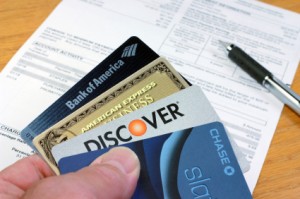 Instant credit cards are offered by many banks and financial institutions, and are readily available online. These cards are approved with nominal credit lines after asking one single question: What is the individual or business credit score of the applicant?
Instant credit cards are offered by many banks and financial institutions, and are readily available online. These cards are approved with nominal credit lines after asking one single question: What is the individual or business credit score of the applicant?
Before applying for any instant approval credit card, check your options out with the free credit card chaser.
If the business applicant has an acceptable rating, then the bank may instantly approve a new credit card line. There may however be limitations on this new account until processing is completed.
What are the limitations of instant accounts?
As mentioned above, instant approvals are generally granted for only small or nominal credit lines. This device brings a business borrower online, opening an account and beginning a relationship that both business owner and card issuer hope will grow over time.
Initially an instant approval credit card account may only be used for online purchases or other digital transactions. This will continue for the two or three-week period necessary to complete account processing and issue the user an actual credit card.
There may also be delays in using an instant account depending on how long it takes the card issuer to set-up online services and grant access to the new cardholder. There will most certainly be delays if questions arise about an applicant’s credit rating.
How is my individual credit rating determined?
Sole proprietors and small business owners will apply for credit as individuals. Individual reports combine information from a number of sources, including credit bureaus and public records. Not only is a payment history considered, but the consumer’s income and work history are also taken into account.
Stability, as measured by the number of years in business, in a home or on a job, is an important factor in determining creditworthiness. Often, debt ratios (a comparison of monthly obligations to income) are calculated to see if an increase in debt is practical and affordable for the applicant.
Finally, an applicant’s assets are reviewed before a bank will grant final credit approval. These add up to the three “C’s” of credit:
- Creditworthiness
- Capacity to pay (income)
- Collateral
Today, banks rely on a number of established agencies and credit bureaus to provide them with accurate up-to-date credit information.
Credit reporting agencies such as Experian, TransUnion, and Equifax assign each individual applicant a FICO credit score based on data that is constantly being collected and reviewed.
What is a FICO score?
Individuals, including many small business owners, are ranked for creditworthiness by the Fair Isaac Corporation or FICO system. This system rates a consumer on a scale between 300 and 850. 700 + indicates a strong, healthy credit history, 600 – 700 is good, while a score lower than 600 would be considered only fair under this system.
Is a business credit rating calculated differently?
Business credit ratings are different from individual credit reports and are generally much simpler. Businesses are judged on whether they pay their bills on time, period. Credit rating firms like Dun and Bradstreet, offer rating and reporting services using their Paydex format.
What if I don’t have a Dun and Bradstreet rating?
Companies without Dun and Brad ratings can still apply for credit by supplying a complete list of their creditors. The bank or card issuer then would have to check with each creditor, one by one, for a current payment history. If an institutional credit check turns up “UN,” or unavailable then this is the only remedy, and instant credit approval wouldn’t be possible.
What is considered a good business credit score?
Dunn and Bradstreet offer a service to their members called Paydex, a widely accepted business credit rating program. Scores on the Paydex chart range from zero to 100, with anything over 80 considered to be golden. A rating of 90 indicates that a company pays its bills early.
A score of 80 shows on-time payments, 70, 15 days late; 60, 22 days late; 50, payments to creditors are 30 days delinquent on average. Scores of 40, 30, and 20 indicate that debt payments consistently lag 60, 90, or 120 days beyond their due dates.
Where can I get help with my credit questions?
Websites like Lifetuner.org provide helpful consumer information dealing with money and credit issues. Many sites offer help on a fee basis and, for the most part, these sites should be avoided. Make sure to check listings for non-profit groups in your area that offer effective credit counseling and financial advice.
For free up-to-the minute instant approval credit card rates, use the credit card finder now!
Similar Articles:
- Are Instant Approval Credit Card Applications Really Instant?
- Where can I get instant business credit card approval?
- Is it possible to find instant online approval credit cards?
- What are some store credit cards that are easy to get?
- Instant Approval Credit Cards
- How do you qualify for the top credit card rates?
- What are the ideal business credit cards for fair credit?








